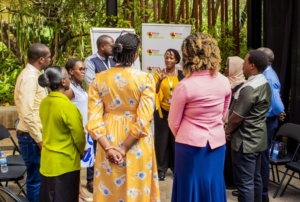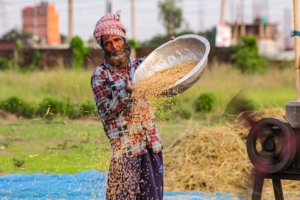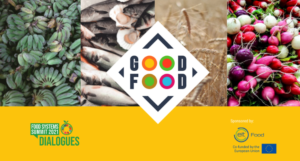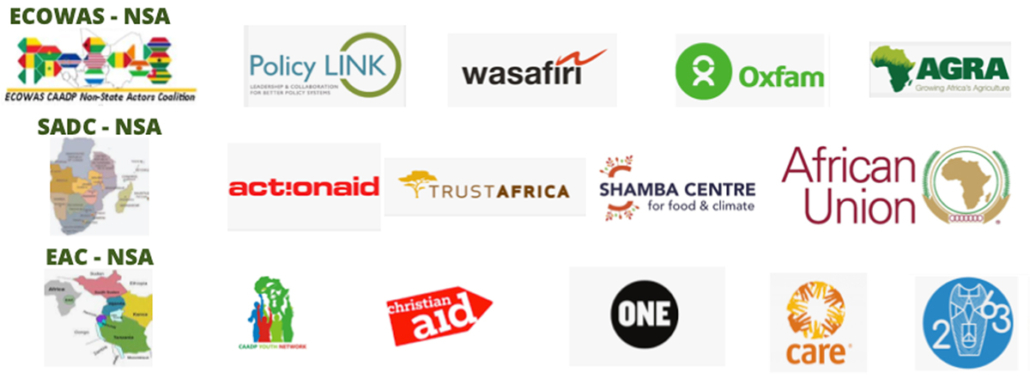The Good Food Hub: Plugging entrepreneurs into food systems transformation
The Good Food Hub supports small and medium businesses for a healthier, more equitable food future. Join our community of changemakers transforming the food system towards sustainability
Latest posts
Share:
Food matters to all of us. How we grow, process, transport, cook, and eat it directly impacts our health, our environment, and our economies.
Food systems are highly complex and interconnected. There is an urgent need, particularly in Africa where Wasafiri is based, to transform current food systems to produce more nutritious food, more equitable livelihoods, and be more environmentally sustainable and resilient to climate change.
Creating such a transformation requires a systemic approach that considers the entire food system, from production to consumption, and engages multiple stakeholders to identify and implement solutions.
While we may not know how to go about that, what we do know is our food systems must become more nourishing, sustainable, equitable, and resilient.
Convening a global community of food businesses
In 2021 the UN Food Systems Summit (UNFSS) set out a bold vision to change the way the world produces and consumes food. Much of food production is done by small and medium-sized enterprises (SMEs).
From restaurants to farms to small-scale processors to the management of local markets and the shops you go to, the food systems around us are made up of many small and diverse players.
As smaller organisations these players often have the agility to change their practices in ways that bigger organisations do not; and as the UN Food System Dialogues showed, many food SMEs are bringing much-needed innovation to the world of food.
And yet, despite the prominent role SMEs play in food, their voices and contributions are too often overlooked as we struggle with what it will take to transform our food systems. And so, the Good Food Hub was born.
The Good Food Hub started as an experiment. We know that food system transformation is going to require unprecedented levels of collaboration; we know that SMEs have an important role to play but have underpowered voices.
Inspired by Systemcraft and specifically the ‘organise for collaboration’ dimension, we launched the Good Food Hub as an online platform for Food SMEs. We didn’t know what would happen next. Would small to medium-sized businesses be interested in joining a global community? Would they find practical value in connecting with like-minded businesses? Would anyone turn up? We didn’t know, but that’s the point of an experiment, and we were willing to learn our way through it.
The Good Food Hub was launched by Wasafiri in 2021 with support from EIT Food. It created a platform through which SMEs have shared knowledge, accessed opportunities for support, and have a shared voice in international policy forums.
“Every day, food entrepreneurs experience the tensions in the food system. Pay more to farmers, or keep food affordable for consumers? Stop using plastic, or reduce food waste? Their frontline insights and innovations are invaluable to policymakers who are otherwise making decisions amidst a cacophony of bombast and old data. The Good Food Hub bridges that gap, elevating the missing but essential voice of SMEs”.
Ian Randall, Director of the Good Food Hub
What’s happened and what have we learnt?
The Good Food Hub now has over 1,500 joined up entrepreneurs, and has been a part of some significant work:
- Promoting sustainable and resilient food systems: By bringing together food SMEs from diverse parts of the world, the Hub has facilitated the exchange of knowledge and experience on sustainable and resilient food systems. This helps SMEs learn from each other about how to grow their businesses whilst improving the food system.
- Fostering innovation and entrepreneurship: The Hub is a platform for sharing ideas and resources which has led to the development of new and more sustainable food products and production methods, as well as the creation of new businesses that can help to address systemic food system issues.
- Improving access to markets: Mastercard held a learning event on the Hub to introduce the Mastercard Community Pass helping members expand their reach and find new customers in hard-to-reach places. This helped Mastercard reach a new audience and SMEs to access new digital services created especially for rural communities in Africa and South Asia. Similarly, the HarvestPlus team shared business opportunities to bring more nutritious crops to market.
- Bringing SME voices into the UNFSS Coalitions of Action: In 2022 the Good Food Hub hosted a series of dialogues with five UN Food System Summit Coalitions, asking how they can each integrate and support the transformative potential of pioneering small businesses. Whether the conversation was about building a green and inclusive financial system for small food businesses by 2030, or spotlighting innovative businesses advancing nature-positive solutions, the Good Food Hub helped garner collective intelligence, ensuring information flows through the different levels of the system. And when the War on Ukraine caused a spike in food prices, we were able to ensure the impact upon SMEs was heard by those managing the global response.
Over the last year, we have done and learnt a lot. We now need to work out ‘so what do we do next?’.
The Good Food Hub has proved a useful and powerful platform for Food SMEs. However, it has also proved a hard model to fund. Food businesses work in a competitive environment and often have little to invest in anything without a direct RoI, and traditional ‘funders’ remain cautious about investing activity that targets systemic conditions, and where the ultimate impact can be hard to measure.
Despite these challenges, we know that system change cannot be achieved by any actor alone, no matter how powerful, informed, or wealthy; we know collective action is the only sort of action in the face of complex problems. And we know that there is work to do in building the conditions for collective action. At Wasafiri this is our work.
Read more on the Good Food Hub
The Good Food Hub was launched by Wasafiri with founding sponsorship by EIT Food. It is a hub for pioneering entrepreneurs to access support, meet peers, and advocate for a more conducive business ecosystem. Are you making our food more nourishing, sustainable, equitable and resilient? Join the community here: Good Food Hub
Photo by Habeeb










